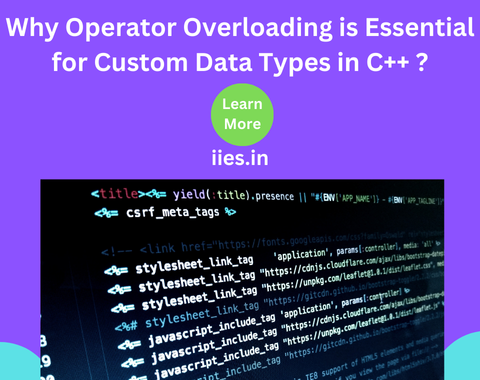Operator overloading allows you to redefine how operators work for user-defined types, such as classes or structures.
This feature makes your classes behave like built-in types, enhancing code readability and usability.
why do we need operator overloading?
#include<iostream>
int main()
{
int a;
int b;
int c=a+b;
}
Possible operations by using ‘+’ symbols.
- i.e., it could be a integers
- float
- big integers
- fractional numbers
- Complex numbers
But if we need to perform on by using + is impossible but by using operator overloading is possible
// C++ Program to Demonstrate
// Operator Overloading
#include <iostream>
using namespace std;
class complex {
private:
int real, imag;
public:
complex(int r = 0, int i = 0)
{
real = r;
imag = i;
}
complex operator+(complex const& obj)
{
complex res;
res.real = real + obj.real;
res.imag = imag + obj.imag;
return res;
}
void print() { cout << real << ” + i” << imag << ‘\n’; }
};
int main()
{
complex c1(10, 5), c2(2, 4);
complex c3 = c1 + c2;
c3.print();
}
Here’s a list of operators that can be overloaded:
- Arithmetic Operators: +, -, *, /, %
- Relational Operators: ==, !=, <, >, <=, >=
- Logical Operators: &&, ||, !
- Bitwise Operators: &, |, ^, ~, <<, >>
- Assignment Operators: =, +=, -=, *=, /=, %=, >>=, <<=, &=, ^=, |=
- Increment/Decrement Operators: ++ (prefix and postfix), —
- Subscript Operator: []
- Function Call Operator: ()
- Member Access Operators: ->, ->*
- Pointer Dereference Operator: *
- Address-of Operator: &
- New/Delete Operators: new, delete, new[], delete[]
- Comma Operator: ,
- Unary Operators: +, -, !, ~
- Type Cast Operators: typeid, static_cast, dynamic_cast, const_cast, reinterpret_cast
Operators not involved in operator overloading:
- Member Access (Dot) Operator: .
- Member Access through Dot with Pointer-to-Member: .*
- Ternary Conditional Operator: ?:
- Sizeof Operator: sizeof
- Typeid Operator: typeid

